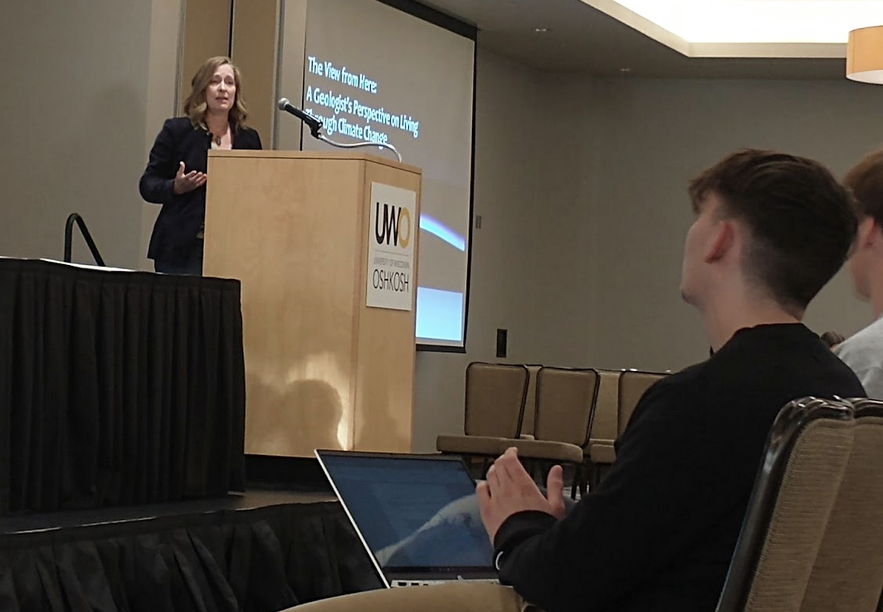Climate change: ‘The rate of change is a big issue’
William Brush/Advance Titan – William Brush / Advance-Titan — Andrea Dutton speaks on the climate change crisis currently happening around the globe.
October 20, 2022
Andrea Dutton, a UW-Madison professor and geologist known for her research on future sea level rise, called for action against climate change in a seminar at the Culver Family Welcome Center Wednesday.
Dutton stressed the importance of recognizing that climate change is happening now.
“Climate change is already here,” she said. “It’s not something we have to deal with in the future.”
Dutton also emphasized how the increasing rate of damaging environmental transformations due to climate change can be disastrous for our planet.
“The rate of change is a big issue,” she said. “A lot of changes are being compressed in a short period of time. A vulnerable ecosystem is more likely to collapse when it meets a challenge like this.”
Dutton provided several examples of how climate change impacts coastal regions in the United States. She also included how Wisconsin is affected, mainly by increasing temperatures during the summer.
“Summer 2021 was the hottest summer for average landfall temperatures,” she said. “And it will continue to climb.” Dutton later clarified that this statistic was based on instrumental records, and therefore doesn’t include climate models from millions of years ago.
Due to climate change happening now, Dutton stressed the significance of making changes to stop the polar ice caps from melting before it’s too late, despite the opposition of some who stand to lose if certain amendments are made.
“There are some wealthy people who stand to lose a lot of money if we make some changes,” she said. “We can negotiate with each other until we’re blue in the face, but we can’t negotiate with the rate [at which] the ice caps are melting.”
Laura Carnahan, a lecturer at UW Oshkosh with a master’s degree in atmospheric science, highlights some changes students can make to slow the process of climate change.
“You don’t have to go out and buy an electric vehicle right now,” she said. “Maybe you eat one extra vegetable meal, like a salad, and one less meat meal, like a burger, each week. Start simple, [and] build from there.”
Carnahan said it is crucial to start forming climate-friendly habits now, as behaviors formed by college students will often stick with them into adulthood.
“As college students, you’re setting up the habits that you’re likely to continue for the rest of your life,” she said. “You’re just adjusting to life on your own. You can make your own decisions now. And, things that you make habitual now will be easier to continue even after you’re done with school.”
In order to show how UWO is wary of climate change, Stephanie Spehar, an associate professor of anthropology at UWO and compere for Dutton’s lecture, said UWO joined the Earth Charter in 2001.
“And its principles have served as a foundation for how we approach sustainability at this institution.” she said.
Th Earth Charter is a document conceived through a United Nations summit that more than70 countries and 6,000 institutions participated in signing, including UWO, Spehar said. She said there are four principles described in the Earth Charter, and each of those are used at UWO, including democracy, economic and social justice, respect and care for the community of life, and ecological integrity.
“All of those things can be found in how we approach and think about sustainability here,” Spehar said.
Dutton ended her talk with a series of 10 words for the audience members to remember about climate change.
“It’s real,” she said. “It’s us. It’s bad. Experts agree. There’s hope.”














